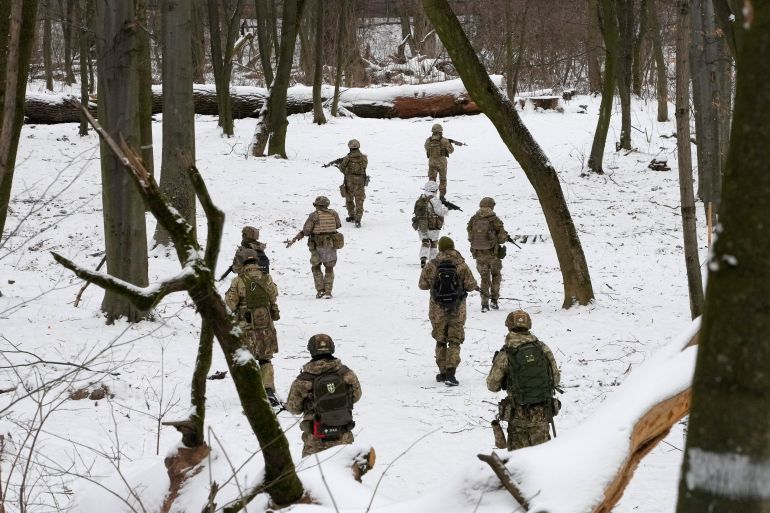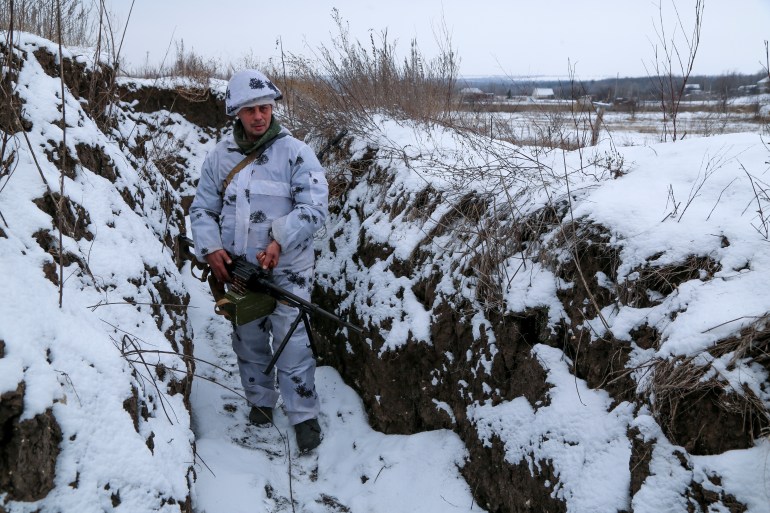‘Hysteria has negative consequences and actually damages Ukraine’
Al Jazeera speaks to Volodymyr Ishchenko, a Ukrainian sociologist, about the crisis between Moscow and Kyiv.

Saint Petersburg, Russia – Tensions over Ukraine show no sign of easing with more than 100,000 Russian soldiers still stationed at the border with Ukraine.
Their presence continues to fuel fears of an invasion, despite Russia’s assurances that it is not seeking a war.
Keep reading
list of 3 itemsUkraine: To war or not to war?
Russians hope for peace as the world talks of war
Moscow says it has the right to move troops where it wants, and blames NATO for undermining the region’s security.
President Vladimir Putin has demanded that NATO, an alliance formed during the Cold War to contain the Soviet Union, never let Ukraine become a member – a move he says would threaten Russia.
Commentators and politicians in the United Kingdom, America and elsewhere, meanwhile, have stressed the need to stand up to any possible Russian aggression.
In this tug-of-war over Ukraine, the voices of Ukrainians themselves appear lost as officials in Kyiv contradict Western accounts of events, while surveys show ordinary Ukrainians are not as keen on NATO as their government.
To find out more, Al Jazeera spoke with Volodymyr Ishchenko, a Ukrainian sociologist and research associate at the Institute of East European Studies, Freie Universität Berlin.
Al Jazeera: How does Ukraine view the crisis, compared to the United Kingdom and United States?
Volodymyr Ishchenko: The interpretation in the West and specifically the media campaign, the scare about an imminent Russian invasion, should be viewed carefully.
This narrative is fed by nameless, anonymous officials to the media, while it’s far from clear that this is an accurate description of Russian plans.
The Ukrainian government doesn’t really buy it, and their very consolidated message is that a Russian invasion or the occupying of major cities are very, very unlikely.
The number of [Russian] troops at Ukrainian borders are not really significantly greater than the troops that have been there since spring last year.
Even if you distrust the government and believe officials will take the first flight out of Kyiv in case of a real attack, there are no patriotic officers in the military or intelligence services coming forward to say the government is lying.
Instead, independent think-tanks specialised in military analysis believe that more realistic threats around Russia would be of a hybrid nature, for example, cyberattacks, attacks on infrastructure. Recently, security services have blamed Russia for a wave of fake bomb threats at schools.
The view from Ukraine is that the media scare comes from American media. This level of hysteria already has negative consequences and actually damages Ukraine. The Ukrainian currency is unstable and losing value, and investors are leaving Ukraine.
Al Jazeera: Why are the interpretations of events so different?
Ishchenko: In the case of the British, and specifically in case of a very recent press release by the UK Foreign Office about the Russian government’s plans in Ukraine, for me, it’s quite evidently connected to the troubles of [UK Prime Minister] Boris Johnson.
When you’re attacked at home, it’s quite typical to start escalating foreign policy.

As for the US, this is speculation, but the US might still try to undermine the Nord Stream project, the pipeline between Russia and Germany.
There is a very clear economic interest – there are gas producers in the US who are direct competitors with Russia.
There are other speculations this may be related to the defeat in Afghanistan, and again, when [US President Joe] Biden’s support is declining, intensifying foreign policy may be one of the solutions. But I would like to emphasise these are speculations.
Al Jazeera: After the Euromaidan revolution in 2014, there was a sense that Ukrainians made clear their desire to be aligned with the West. Russia fears that NATO may soon be at its doorstep. How popular is the alliance among Ukrainians?
Ishchenko: That’s a very important question, because in these discussions on whether Ukraine will ever be allowed to join NATO, very few people are actually asking what Ukrainians really want.
And by Ukrainians, we need to understand all Ukrainian citizens, and not simply the Ukrainian government or the professional English-speaking civil society, who are usually the commentators for Western media.
Before Euromaidan in 2014, support for NATO was very low.
When it was decided in Bucharest that Ukraine and Georgia will join NATO at some point in the future, support for NATO in Ukraine was below 20 percent.
Most Ukrainians were split – some wanted a neutral, non-bloc status for Ukraine as inscribed in the constitution and others supported joining a military alliance with Russia.
After Russia’s annexation of Crimea (in 2014) and the war in Donbas, some started to see NATO as a defence against Russia.
But still, support for NATO was lower than the support for the EU, which had a really solid majority.
This may have changed since 2019, when two things happened.
First, [Ukraine President Voldomyr] Zelenskyy came to power and was hugely popular and pro-NATO, and he may have detoxified NATO for those who may have seen it in connection with the aggressive nationalism of the [President Petro] Poroshenko era. And recently, more people have been saying the latest tensions wouldn’t have happened if we were in NATO.
There is some evidence to show support for NATO has increased to over 50 percent.
But this crisis will be over at some point, one way or another, and those who are understandably scared might just cool down. If NATO ends up compromising with Russia, some Ukrainians would see it as a betrayal.
Al Jazeera: Is Russia responsible for fuelling the nationalism in Ukraine it often speaks of?
Ishchenko: Partially, yes. But I would certainly not reduce the rise of nationalism in Ukraine to simply a reaction to the Russian threat.
Ukrainian nationalism in the form it’s developed doesn’t make Ukraine stronger, it makes it weaker and more divided.
The reason why it’s rising, it’s kind of like a compensation for the deficiency of the Euromaidan revolution.
People really aspired for revolutionary change and wanted to see a different Ukraine, but it ended simply in the interchange of the elite and almost no changes at the institutional level.
There are the same people in the Forbes rich list, the same legislation that allows them to exploit state resources for personal enrichment.
But instead of this, let’s rename the streets, let’s remove the Lenin statues, let’s re-escalate the language issue. This creates an illusion of change when there are no substantial changes. We’ve seen very similar processes in other post-Soviet states.
Al Jazeera: Do people see a possible resolution with Russia as a capitulation to Putin?
Ishchenko: Yes, some people perceive it precisely like this, and there were small protests in 2019 by the so-called anti-capitulation campaign. Those movements were against Zelenskyy’s slight attempts towards implementing the Minsk agreements in the first months of his presidency.
But when the Minsk agreements (which sought to stop conflict in Donbas) were signed in 2015, they had majority support among Ukrainians. There was a real hope that these accords may bring peace. But Ukrainians now see the agreements as moving nowhere, because shootings and bombings in Donbas randomly continue. Support for the Minsk agreements has declined.
If Western governments and Ukraine had a consolidated position that the Minsk agreements need to be implemented, that there is a need for reconciliation with separatists, and a necessity to reach peace with Russia … they may win majority support.
The problem is that they are not doing this.
This interview was edited for clarity and brevity.